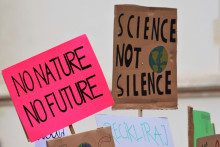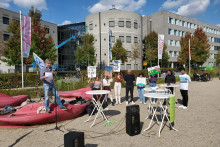When the air alarm goes off at noon on Monday, the first reader will start. 'We will begin with the summary for policy makers,' explains Cyber Security student Erik Kemp, one of the initiators on behalf of Scientists4Future. 'Which, at 40 pages, is quite concise compared to the full report. But the summary reflects exactly the current state of affairs. Afterwards, we will start reading out the longer version.'
Approachable
The read-aloud marathon lasts until 6 p.m. that same day. 'For the full report, which is over 3,000 pages, we would probably need weeks,' says Kemp. 'Moreover, we want participants to read aloud for a maximum of half an hour. That is why we are still looking for as many people as possible to read out the report.'
The initiative has come over from Amsterdam, where (part of) the IPCC report has been recited at both the University of Amsterdam and Vrije Universiteit. 'Our goals are to get the community together and to draw attention to the contents of the report,' says Kemp. 'There is a lot of discussion about the climate, but for many people the step to read such a report is too big. While it is actually good and important to read up before getting involved in a discussion. That is exactly what we want to create in an accessible way. Even a passer-by always picks up on something.'
Awareness
While recent climate activists at UT opted for 'civil disobedience' in the form of blockades, that is by no means the intention of this initiative, says the student. 'There is nothing demonstrative about this action and we are not disrupting anything. We absolutely do not want that from Scientists4Future either. All we do is read out the report and we use the screen in the atrium to show graphs from the report. Our concern is that people have the opportunity to meet others; others who have the energy to tackle the climate crisis.'
According to Kemp, that starts with individual behavioural change. 'I often say: fly less, buy less, meat less. If we really want to change something, people need to engage in an internal awareness process. Actually the same process as Mark Rutte, before his apology speech about the Netherlands' slavery history. Such a confrontation with yourself is perhaps even more important than researching carbon capture technologies or installing solar panels. I hope we can help create that awareness with this action.'






